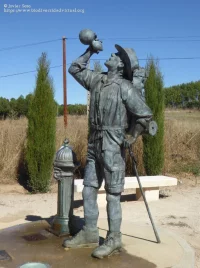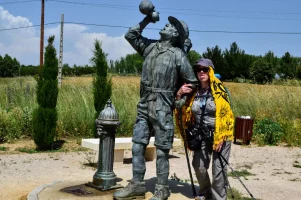I struggled with French for four years and German for two. They both won, even though I got good grades in my GCEs. Yet hundreds of years ago, some people were fluent in half a dozen, or more, languages. It is said that Elizabeth I spoke nine languages; Isaac Newton wrote the Principia in Latin;
Thomas Jefferson spoke English, French, Italian, and Latin, and could read Spanish and Greek; and Jesus spoke at least three and possibly four languages. Nowadays, it seems that very few native English-speakers can speak a second language. (Some don't even speak English proper, innit?)
I would not feel badly about it were I you.
Literacy was fairly wide-spread amongst the nobility, but even so, being functional in several languages did not necessarily require literacy in all of them. Monarchs typically had scholars in residence who could transcribe what was spoken.
The thin slice of the world you cite here had, as a matter of course, to be continually engaged in the languages of those with whom they would interact for political purposes.
A personal illustration of modern demands (that still come not even close to the language demands on scholars and monarchs of the Renaissance forward):
At one time I was quite fluent in Quebecois French; now I lean more to the passively-bilingual side. If I work for a while in France (not that I have done recently), I become quickly accustomed to working in both the academic French of my discipline, and the every-day French of the commons. I remain quite able to read and translate from bio-medical texts from French and Spanish into English, and with a bit of effort I can do the same with Portuguese and Catalan. Why? Because my step-family is French-Canadian, because I lived for a time in La Belle Province, and completed my PhD in Quebec in the anthropology of medicine. Also: 2 years of Latin in school (too long ago for me to recall the rules, but sedimented in such a way that I can quickly grasp the mechanics of any Latinate language). I also had 7 years of "French Immersion" in school, where half my day was in French, and half in English. But I have not had to function *daily* in any language other than English since I was in Montreal 30 years ago... My step-sister still lives in Quebec, where her personal life is in French and her professional life is in English... so when we are together we speak Frenglish... with more English because there's generally greater tolerance for errors to be made in English than in French.
Because of this background, I can quickly become conversational in Spanish while I am in Spain, and I pick up new bits and pieces of grammar and other mechanics on every trip. Put me in region without a heavy Latinate mix, I would founder.
The point here is that *I* am not special, though I have a very good ear for spoken language. What is special is that I was put into early opportunities that few North Americans are: practical *and* academic language learning, used and reinforced with daily use.
I do not think there is strong evidence that polyglots really have more individual aptitude or achievement. I can think of two sort of obsessive friends who have some ability with very disparate languages and even so, they cannot *function* in more than two more closely related languages.
TL;DR: do not compare yourself to polyglots in situations that combine high demand with high opportunity. Most of us are, at best, more similar to the plebiscite of the rural Roman Empire, where demand for literacy was low, as was the opportunity to use more than one language on a quotidian basis. That's how regional variants developed...
Humans are generally quite capable of learning what they can use practically. Otherwise, we simply have to let some things go so that other demands can be met.

























